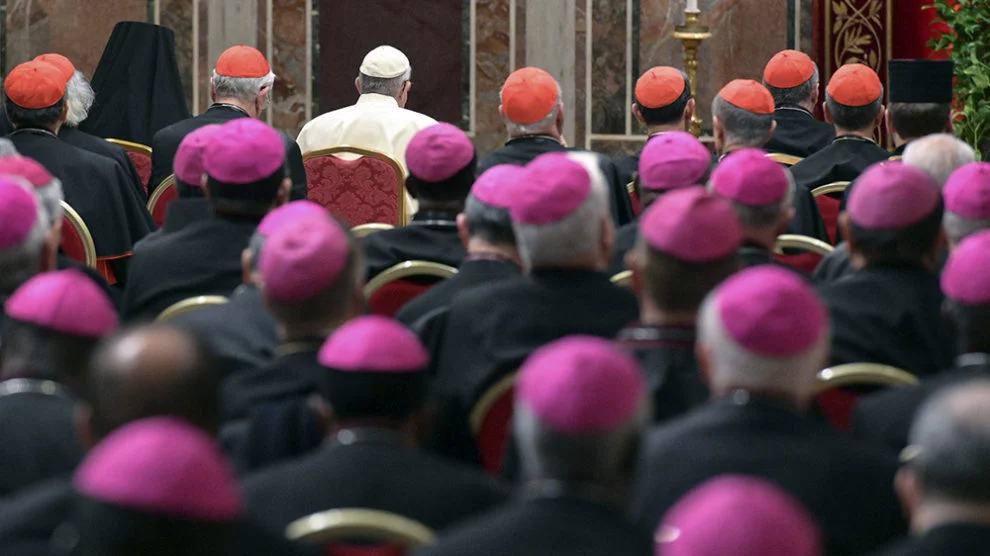Grading the Vatican Abuse Summit
By Mark Silk
The consensus view is that the Vatican pretty much flunked its summit on the protection of minors. Yes, there was some good rhetoric, some powerful statements above all by women presenters, but what was accomplished? Where were the concrete steps that Pope Francis called for when he opened the meeting? As a New York Times editorial concluded, “[A] malignancy whose primary victims are trusting children must be treated by immediate and radical measures, not by appeals or hand-wringing.” Part of the explanation for the consensus is that news stories about anything to do with clergy sexual abuse almost invariably quote the reaction of leaders of victims’ groups. And these leaders find it very hard to say anything good about the church. For example, in welcoming the conviction of Australian cardinal George Pell earlier this week, David Greenwood, secretary of the U.K.-based Minister and Clergy Sexual Abuse Survivors (MACSAS), told Newsweek, “We have tried to work with and encourage Catholic organizations to make changes to their treatment of children and survivors of abuse but have been rebuffed. It has become clear to us that the Catholic Church is incapable of change from within.” Actually, that depends on what you mean by “from within.” Over the centuries, the impulse for change—reform—has indeed come from the outside: the Swabian monarchy in the 11th century, popular heresy in the 13th, the Protestant Reformation in the 16th, modernity in the 20th. But in each case, the reform was not imposed from without. It came from within, as it must. We’ve seen such a process take place in this country. After the Boston Globe‘s Spotlight Team ushered in a nationwide firestorm of exposes in 2002, the country’s bishops put in place what can only be called “immediate and radical” measures to get the sexual abuse of minors by priests under control. If you don’t think the Dallas Charter for the Protection of Children and Young People worked, consider that the lists of priests credibly accused of abuse now coming out of dioceses around the country include just a handful of cases since 2002. The 21 points presented “as an aid to reflection” at last week’s summit are in fact the “protocols” that Pope Francis promised would guide the heads of national bishops’ conferences in devising “general programs” of their own. Assuming they adhere to the protocols, as Frances said they must, each country will have a Dallas Charter of its own—and then some. Reflection Point 7 is: “Establish specific protocols for handling accusations against Bishops.” Such a protocol was not included in the Dallas Charter, and is its greatest weakness. Indeed, the church’s great failing altogether in this crisis has been its inability to discipline bishops for covering up and otherwise mishandling abuse cases. Pope Francis himself has taken steps in the right direction, mandating that the Congregation for Doctrine of the Faith take charge of such accusations and then, after the CDF said it couldn’t do it, transferring responsibility to the four Vatican offices charged with overseeing bishops and other ecclesiastical superiors. In 2016, his apostolic letter “As a Loving Mother” lowered the bar for removing bishops from office, from malice in stewardship to inability or incapacity to do the right thing. For all that, the Vatican officials in these offices have dragged their feet in establishing procedures for removing a bishop and making these known and available. On Wednesday, Cardinal Blase Cupich of Chicago, one of the organizers of the summit, told Joshua McElwee of the National Catholic Reporter, that bishops had in fact been removed from office under the law but wouldn’t say which ones. The four offices, he said, need to have a common way of holding bishops accountable. “So they’re working together right now, I understand, on making that happen.” Two years after “As a Loving Mother,” five months after the announcement of the summit, you’d think the Vatican would have been able to get its own act together by way of providing an example to the national bishops conferences. Much still needs to be done to blast clean the embarnacled Barque of Peter. Still, bottom line, I’m far from giving the Vatican an F in the course it’s taken on the protection of minors. I’m giving it an Incomplete.
|
.
Any original material on these pages is copyright © BishopAccountability.org 2004. Reproduce freely with attribution.
